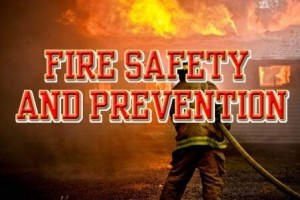 The NFPA reports “only 8% said their first thought on hearing a smoke alarm would be to get out!” That’s alarming! Yes, yes, pun intended. And although 71% of Americans have an escape plan in case of fire, only 47% of them have practiced it.
The NFPA reports “only 8% said their first thought on hearing a smoke alarm would be to get out!” That’s alarming! Yes, yes, pun intended. And although 71% of Americans have an escape plan in case of fire, only 47% of them have practiced it.
Fire Safety Tips:
- PLEASE plan and practice a home fire escape drill that includes two ways out of every room and an outside meeting place.
- Teach children how to escape on their own in case you can’t help them.
- If you have to escape through smoke, get low and go under the smoke to your way out. Close doors behind you as you leave.
- Call 911 from outside your home!
- Install smoke alarms, both ionization smoke alarms and photoelectric alarms, on every level of your home.
- Smoke alarms should especially be installed inside and outside bedrooms and sleeping areas.
- Use interconnected smoke alarms and test them all at least once a month.
- People who are hard-of-hearing or deaf can use special alarms that have strobe lights and bed shakers.
- Replace all smoke alarms when 10 years old.
Fire Prevention Tips:
Kitchen
- The leading cause of kitchen fires is unattended cooking.
- Stay in the kitchen especially when frying, grilling or boiling food.
- Use a timer to remind you when simmering, baking or roasting food.
- Keep anything that can catch fire away from your stovetop.
Candles
- More than half of all candle fires start when things that can burn are too close to the candle.
- Avoid using candles in the bedroom or places where you may fall asleep.
- Keep candles at least 1 foot away from anything that can burn.
- Do not place candles in windows where blinds or curtains could catch fire.
- Never leave a child or pet in a room with a burning candle.
- Never use a candle if oxygen is used in the home.
Smokers
- One out of four fatal victims of smoking related fires is not the smoker whose cigarette started the fire.
- If you smoke, smoke outside. Most deaths result from fires started in living/family rooms, dens or bedrooms. Never smoke in bed.
- Do not discard cigarettes in mulch, potted plants, landscaping, peat moss, dried grasses, leaves or other things that could ignite easily.
- Before you throw away butts & ashes, douse with water or sand.
Electric
- To prevent electrical fires, make sure major appliances (refrigerators, dryers, washers, stoves, air conditioners, etc.) are plugged directly into wall outlet.
- Do not use light bulbs that exceed the maximum wattage for your lamps or light fixtures.
- If you experience any of the following, call a qualified electrician or your landlord: frequently blowing fuses or tripping circuit breakers, tingling feeling when touching electrical appliance, discolored or warm wall outlets, sparks from an outlet.




